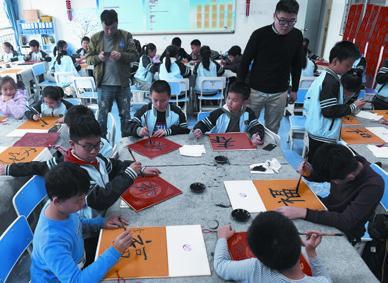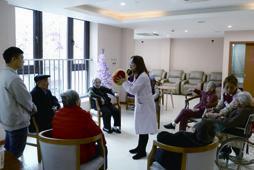GREETING 2020

Tourists participate in a bonfi re to welcome the New Year on December 31, 2019, in Hemu Village, best known for its beautiful winter scenery, in Xinjiang Uygur Autonomous Region, northwest China.
The village attracted tourists, who took part in activities such as horse-drawn sleigh rides, snow sprinkling and a carnival for the New Year.

New Year Greetings
Students write the Chinese characters fu, meaning good fortune, and chun, meaning spring, during a calligraphy writing activity at a school in Nanning, capital city of Guangxi Zhuang Autonomous Region, south China, on December 31, 2019.
Holiday Directive
A directive issued by the General Offi ces of the Central Committee of the Communist Party of China (CPC) and the State Council on December 26, 2019 urged to look after people in diffi culties during the festive season leading up to the Spring Festival holidays.
Laying down the priorities for CPC and government work during the most important national holiday, it said Party committees and administrations at all levels should offer relief funds for people in dire poverty. Assistance should be strengthened to needy groups, including senior citizens in straitened circumstances, people with disabilities, and leftbehind children in rural areas.
Measures should be improved to address employers defaulting on the wages of migrant workers.
The directive also said a stable supply of commodities, especially pork, should be ensured to satisfy consumption demand during the holidays. Besides, there should be diverse cultural activities and highquality cultural products to promote the fi ne traditions of the Chinese nation.
The transport authorities should be prepared for the travel rush while public security agencies should strengthen patrols and checks to improve social security.
The directive also stressed the importance of production safety. Offi cials have been asked to strictly follow frugality rules.
Minors Mental Health
All schools are required to offer psychological services to students by the end of 2022 as part of an action plan targeting the mental health of children and adolescents.
Each school should set up a psychological service platform or have school doctors to provide students with mental health services by the deadline, according to the plan jointly released by 12 authorities including the National Health Commission and the Ministry of Education.
Peoples courts at all levels are required to take effective measures to help root out non-payment of wages, including an improved onestop litigation service mechanism and a green channel to facilitate litigation services, the top court said in a circular.
Migrant workers unpaid wages cases should be handled fairly and effi ciently by developing easier and more ways to fi le cases and settle disputes.
The SPC also said peoples courts at all levels should carry out special and concentrated judgment enforcement, giving priority to unpaid wages cases to ensure migrant workers receive their benefi ts in a timely manner.
It also urged to improve the mechanism for safeguarding the rights and interests of rural migrant workers regarding their payments and asked enterprises to fulfi ll their obligations to pay workers wages in accordance with the law.

A Rosy Picture
Workers arrange silk fl owers at a factory in Panggezhuang Town in Hebei Province, north China, on December 31, 2019. With the local governments support, the silk fl ower industry in Panggezhuang has registered consistent growth. The town now produces over 1,000 kinds of silk fl owers, providing jobs and incomes to nearly 1,000 women.
Better Air
The air quality in key regions has improved notably thanks to air pollution control efforts since the beginning of the year, environmental authorities said on December 26, 2019.
In the Beijing-Tianjin-Hebei region and its neighborhood, the number of days with good air quality in November 2019 jumped 18.6 percentage points year on year to 63 percent, data from the Ministry of Ecology and Environment (MEE) showed.
These areas also saw the density of PM2.5, the fi ne particulate matter that causes smog, slip 25.9 percent to 63 micrograms per cubic meter in November 2019, Liu Youbin, a spokesperson with the MEE, told a press conference.
Other areas also reported improved air quality during the January-November period in 2019, with the density of PM2.5 in central and southwest regions dropping 22 percent and 13 percent year on year, respectively.
Liu said steps have been taken to curb the trend of rising PM2.5 density in some areas.
The MEE will continue to guide local governments in targeted pollution control and trans-regional joint pollution prevention and control.
The Forbidden City
The Palace Museum, also known as the Forbidden City, will hold a series of seminars, exhibitions and other activities as the former imperial compound turns 600 in 2020, its curator Wang Xudong said on December 30, 2019.
In addition, a series of research outcomes will be released and fi lm and television works produced.
The year 2020 also marks the 95th anniversary of the Palace Museum.
The exhibitions will cover ancient architecture, calligraphy, paintings as well as other aspects of Chinese and foreign civilizations. One exhibition will highlight the changes that have taken place in the Forbidden City, with a focus on changes in 20-plus important years.
Some 600 high school students from Taiwan, Hong Kong and Macao will be invited to visit the museum.
Commemorative tickets, coins and stamps will be issued to mark the occasion.

Community Care
Staff members interact with senior citizens at a community-based elderly care service station in Shanghai, east China, on January 2. The city has stepped up efforts to diversify community elderly care services, which include long-term nursing, day care and assisted living.
Bank Reform
In the latest effort to boost growth, Chinas central bank has pledged to push market-based reforms, aiming to signifi cantly bring down real interest rate levels and cut social fi nancing costs.
Prudent monetary policy should be pursued with moderate fl exibility to maintain market liquidity at a reasonably ample level, according to a statement published on January 1 after a regular meeting of the Monetary Policy Committee of the Peoples Bank of China.
China will ensure that the increases in M2 money supply(cash in circulation and all deposits) and aggregate fi nancing will be in keeping with nominal GDP growth, the statement said, ruling out the possibility of “fl ood-like” stimulus.
Financial supply-side structural reform will be advanced to enhance support for high-quality development, and more efforts will be made to guide fi nancial institutions to step up loans to the real economy.
The central bank also promised to expand two-way fi nancial opening up, push the switch to new pricing benchmarks of outstanding loans, and keep the renminbis exchange rate basically stable at a reasonable and balanced level.
It will seek a balance between stabilizing growth and preventing risks, anchor market expectations and forestall systemic fi nancial risks, the statement said.

Growth Drivers
An engineer adjusts a robotic packaging arm at a workshop in an industrial park in Yongnian District, Handan in the northern province of Hebei, on December 29, 2019. Yongnian has sped up the development of hi-tech industrial clusters, creating new engines for high-quality development.
Consumption Boost
An executive meeting of the State Council on December 30, 2019 rolled out measures to give facelifts to more pedestrian streets in order to spur consumption, investment and employment after related pilot programs registered success.
The meeting highlighted a market-oriented approach, the introduction of tailored policies and the development of small shops to create more job opportunities.
At the end of 2018, China launched pilot upgrading programs for 11 pedestrian streets, which have since seen the refurbishment of over 800,000 square meters of commercial areas, and the introduction of more than 900 famous brands and dozens of fl agship stores, according to Yin Hong, an offi cial with the Ministry of Commerce.
During the fi rst 11 months of 2019, the shopping streets saw business turnover surge 17.3 percent year on year to 115.1 billion yuan($16.4 billion), with customer fl ow rising 21.2 percent to some 825 million visits.
The streets also made notable progress in integrating online and offl ine businesses and promoting the coordinated development of commerce, tourism and culture, Yin said.
Tesla Delivery
Fifteen Model 3 cars produced by U.S. electric carmaker Tesla Inc.s Shanghai facility were handed over to company employees on December 30, 2019. Deliveries to customers would start in January, company offi cials said at a ceremony.
Tesla signed an agreement with the Shanghai Municipal Government in July 2018 to build the factory. In October 2018, the company was approved to use an 864,885-squaremeter tract of land in Lin-gang Area, a high-end manufacturing park in the southeastern harbor of Shanghai, for its fi rst overseas gigafactory. Its construction started on January 7, 2019.
With a designed annual capacity of 500,000 electric cars, the Shanghai factory currently produces 280 units per day and will increase its production capacity, said Song Gang, the plants manufacturing director.
The proportion of the car parts produced in China will also be increased from the current 30 percent to 100 percent at the end of 2020, Song added.
Investor Protection
The Supreme Peoples Court (SPC), Chinas highest judicial authority, issued a judicial interpretation applicable to the Foreign Investment Law on December 27, 2019, aiming to better protect the legitimate rights and interests of foreign investors in the country.
Courts around the country will not support contracted parties who claim that investment contracts related to areas not on Chinas negative list for foreign investment market access are void because the contracts have not been approved or registered by administrative authorities, according to the document.
Investment contracts related to areas on the negative list can still take effect as long as the parties concerned take necessary corrective measures before courts make judgments, Luo Dongchuan, Vice President of the SPC, said.
Investment contracts that did not meet the requirements of the negative list when they were signed can still be deemed effective if the negative list loosens restrictions before court judgments take effect, Luo said.
“These designs are aimed at guaranteeing the legitimate rights and interests of investors to the largest extent under the prerequisite of safeguarding the stability of foreign capital management,” he said.
The interpretation took effect on January 1.

Automatic Pilot
A self-driving vehicle during a test drive in Beijing on December 30, 2019. The city added a new 40-square-km area for testing self-driving vehicles with passengers on board on the day, as it pushes for further application of the technology, according to the Beijing Municipal Commission of Transport.
First eWTP Launched
The fi rst Electronic World Trade Platform (eWTP) was offi cially launched in Hangzhou, capital of Zhejiang Province in east China, on December 27, 2019, according to local customs.
The eWTP initiative was proposed in 2016 by Jack Ma, founder of the e-commerce powerhouse Alibaba. It aims to promote publicprivate dialogue to improve the policy and business environment to enable small and medium-sized enterprises (SMEs) to participate in cross-border electronic trade.
SMEs can benefi t from a series of preferential policies provided by the eWTP in areas including customs clearance, settlement exchanges and tax refunds.
As Chinas comprehensive cross-border e-commerce pilot zone, Hangzhou is leading the country in the development of cross-border e-commerce.
The launch of the eWTP is thanks to the joint efforts of Hangzhou Customs and Alibaba, which have taken innovative steps in tax refunds, exchange settlements and other aspects, according to Tang Li, the eWTP public service platform project manager.
Apart from Hangzhou, Alibaba is working with Malaysia and Belgium to build the eWTP. The platform is expected to promote interconnection between Hangzhou and the world, and facilitate convenient and effi cient trade for SMEs.
SMME Contribution
Small, micro and medium-sized enterprises (SMMEs) made important contributions to Chinas economic development during the 2014-18 period, offi cial data showed.
At the end of 2018, the number of SMMEs rose 115 percent over 2013 to 18.07 million, making up 99.8 percent of all legal entities, according to a report on Chinas fourth economic census released by the National Bureau of Statistics.
Those enterprises employed around 233 million people, accounting for 79.4 percent of all enterprise employees nationwide, the report said.
Total annual operating revenue of those enterprises stood at 188.2 trillion yuan ($26.9 trillion) in 2018, accounting for 68.2 percent of the revenue of all enterprises in the country.
Private SMMEs boomed during the period, with the number surging 166.9 percent over 2013 to 15.27 million at the end of 2018, accounting for 84.4 percent of all enterprises.
Nearly 40 percent of those f rims operated in the central and western regions of the country, while those in the eastern region kept the advantage in generating operating revenue, according to the report.

Digital Promotion
An employee at an e-commerce company dressed in ancient-style clothes promotes navel oranges through a live-streaming session in Fengjie County, Chongqing Municipality in southwest China, on December 28, 2019. In recent years, marketing campaigns on social media platforms have boosted orange farmers sales.

